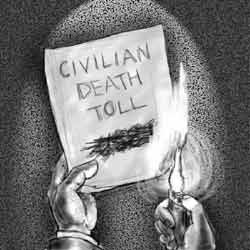Donate to IMPACT
Click below for info


• Collateral Damage
• Quickies
(music reviews)
 • E-Mail Comments
• Archives
• Subscribe to IMPACT
• Where to Find
IMPACT
• Buy IMPACT T-Shirts
• Ordering Back Issues
• Home
|

A surreal sky bends you over your young child, a morbid tapestry: forlorn skin painted over in ash, her deadened innocence wafts putridly; charred wounds leave gaping holes in her bloodless body. Her vacant eyes are tragically buried in a cruel grave made of rubble and shrapnel, betrayed by the inhumanity, the indifference to life, of those that murdered her with such pinpoint accuracy. Among a mangled landscape of destruction, her tiny frame now lies, perverted by politics, ravaged by reasons, murdered by liberation, and wholly raped of life.
Those that have experienced the birth of their own child know that the profundity of such elevates an otherwise egotistical existence to a selfless one. Thus it takes little to no imagination to understand the sometimes vengeful nature of a parent experiencing the loss of a child and, in this case, one tragically caught between the bombs and mayhem of politics and warring parties. Whether an act of terrorism, or a virtuous attempt to liberate a people from the rule of a tyrant, once another man has taken your child's life, humanity becomes a luxury your heart cannot afford.
The 2002 movie Collateral Damage, starring Arnold Schwarzenzegger, is a good expression of this psychological turmoil. In the movie, Schwarzenzegger's character sets out to avenge the death of his wife and daughter, who were casualties of a terrorist's bombing. This brand of American justice seems to appeal to many Americans, as the popularity of the movie would indicate; it has grossed more than $40 million in the U.S. alone. However, there is a flagrant sense of irony when one considers how Americans might respond to a Middle Eastern vigilante, like Arnold, who tries to get back at a U.S. military adviser who commanded some inexact "strategic" bombing, which resulted in the death of his wife and child.
 While the U.S., from Hollywood to Washington D.C., has always been quick to sympathize and console American indignation, bordering on vigilantism, Americans have proven less apt to recognize similarities between their emotionalism and that of other nations and people with which they are involved. Whereas the tragic loss of life on September 11, 2001 precipitated a blank check for President Bush to hunt down terrorists, and even wage war in Iraq, Americans are not, in turn, willing to grant Iraqis, for example, the same right to indignation and fury. While the U.S., from Hollywood to Washington D.C., has always been quick to sympathize and console American indignation, bordering on vigilantism, Americans have proven less apt to recognize similarities between their emotionalism and that of other nations and people with which they are involved. Whereas the tragic loss of life on September 11, 2001 precipitated a blank check for President Bush to hunt down terrorists, and even wage war in Iraq, Americans are not, in turn, willing to grant Iraqis, for example, the same right to indignation and fury.
To date, many more civilians have died as a direct result of U.S. military intervention in Iraq than the number of innocent people that died in the Twin Towers. But not only has the press hardly spoken up on the issue of civilian deaths in Iraq, the U.S. is insisting that the number of those killed is not at all worth tallying–an attitude that will likely cultivate the same vigilantism portrayed in the Schwarzenzegger movie.
Specifically, the Dec. 10, 2003 article "No More Iraqi Casualty Counts?" by the Associated Press reported, "Iraq's Health Ministry has ordered a halt to a count of civilians killed during the war and told its statistics department not to release figures compiled so far." Many war observers, like John Sloboda, co-founder and press spokesperson for IraqBodyCount.net, are not the least bit surprised by the development. Sloboda says that he has no doubt the demand to stop the counting came directly from U.S. authorities in an effort to suppress further discontent among the indigenous population.
"The general Iraqi population will be as keen to establish this figure as the U.S. population wished to know the death toll in 9-11," he explained. "It is inconceivable that an Iraqi would order the stopping of this count unless there was, metaphorically, a U.S. gun at his head."
The U.S. is a long-time opponent of counting civilian casualties resulting from its wars, instead promising to employ meticulous and lengthy measures to minimize such casualties. Sloboda says the country's policy of not tallying such figures is almost entirely politically motivated.
Both the U.K. and the U.S. claim they do this because it is not possible to be totally accurate, and because "every reasonable effort was taken to avoid civilian casualties," Sloboda said. "The actual reasons relate to the management of domestic opinion. The U.S. will suppress any electorally inconvenient information. They also know that almost no head of state will dare to challenge them on this, neither will the U.N., nor the Red Cross. Even the U.S.'s critics, such as Putin, will never challenge the U.S. on civilian casualties, because there is similar blood on their own hands."
Historians have shown there are plenty of reasons for U.S. policy makers to avoid such morbid musings. The U.S. has, in part, been responsible for two million North Korean civilian deaths during the Korean War, and more than one million civilian deaths during the Vietnam War (American Foreign Relations, Clifford, et al., 2000). Other macabre statistics reflecting hundreds of thousands of civilian deaths resulting from U.S. military action, specifically the questionable use of the A-bomb on Hiroshima and Nagasaki in order to bring about "the end" of World War II, paint a horrific portrait of the consequences resulting from such action.
 While the U.S. continues to refrain from such research, organizations like IraqBodyCount.net fill a void by maintaining a studious, in-depth account of the complete death toll in Iraq. To date, reports have consistently agreed that more than 3,000 Iraqi civilians have been killed. According to a detailed investigation by the Associated Press, at least 3,240 civilians have been killed, and those deaths only occurred between March 20 and April 20 of 2003. In fact, the investigation concluded that the total number of civilian deaths over the course of the war "was sure to be much higher" ("No More Iraqi Casualty Counts?" Associated Press, Dec. 10, 2003). While the U.S. continues to refrain from such research, organizations like IraqBodyCount.net fill a void by maintaining a studious, in-depth account of the complete death toll in Iraq. To date, reports have consistently agreed that more than 3,000 Iraqi civilians have been killed. According to a detailed investigation by the Associated Press, at least 3,240 civilians have been killed, and those deaths only occurred between March 20 and April 20 of 2003. In fact, the investigation concluded that the total number of civilian deaths over the course of the war "was sure to be much higher" ("No More Iraqi Casualty Counts?" Associated Press, Dec. 10, 2003).
Still, IraqBodyCount.net indicates that U.S. bombing and other military action have likely led to more than 7,000 civilian deaths. Meanwhile, on Oct. 28, 2003, The Project on Defense Alternatives, a Cambridge, Mass. think tank, reported an estimated "4,300 non-combatants were killed during the major combat phase of the war in Iraq" ("Iraq war killed 13,000, study finds," Agence France-Presse, Oct. 28, 2003). The group has also estimated that 3,500 Iraqi civilians were killed during the 1991 Gulf War.
The fact that such a greater number of Iraqi civilians have died as a result of an American invasion, again far greater than the number of American civilians that died during the September 11 tragedy, offers a disquieting juxtaposition. In considering the wrathful sentiments of Americans following the collapse of the Twin Towers–some believe such ire enabled the President to draw loose connections between Saddam and al-Qaida in order to get backing for the war against Iraq–one might warily consider whether those Iraqis who have lost loved ones have an equal right to resent the U.S. bombs, which perpetrated the majority of the civilian killings, as Americans resented the terrorists. Some question if, for instance, the U.S., fueled by righteous indignation, was correct in responding to thousands of American civilian deaths by waging war on those responsible.
Would the same principle of rightness in forceful action apply to Iraqis avenging the deaths of their loved ones? While most would argue that the U.S. had good intentions in overthrowing Saddam's regime, many fail to recognize that the parallel between the situations is that, in both cases, innocent people were obliterated. Such a realization drove a practically minded Martin Luther King to expound, "More and more I have come to the conclusion that the potential destructiveness of modern weapons of war totally rules out the possibilities of war ever serving again as a negative good."
Whereas politicians and analysts often measure the success of events like war in their totality, the roots of terrorism, incessant feuds among groups like the Palestinians and Jews, and even anti-Americanism often spring from sorrowful experiences among the populace during such altercations, which then fester and manifest in prolonged resentment. Though Americans might view the war as an overwhelming success, especially with the capture of Saddam, instances where the U.S. has attempted to kill Saddam and his sons by bombing public buildings or raiding homes are likely to equally exist in the conscious of the people.
 Attempts to kill leaders and figures of great importance–decapitation attacks, as they are called–have been determined to be responsible for a significant number of the total civilian casualties. According to a story reported on Dec. 12, 2003 by OneWorld.net, an online news agency, the New York-based organization, Human Rights Watch had recently determined that "Hundreds of civilians were killed by Coalition cluster bombs and air strikes designed to decapitate the Iraqi leadership." The article went on to explain that while the report had "found that U.S.-led Coalition forces in Iraq generally tried to comply with international humanitarian law, nonetheless concluded that U.S. ground forces were too eager to use cluster munitions in populated areas, and that 50 decapitation attacks failed to hit a single one of their targets, but caused dozens of civilian deaths and injuries" ("Cluster Bombs, Decapitation Bombing Killed Hundreds of Iraqis, Says Human Rights Watch," OneWorld, Dec. 12, 2003) Attempts to kill leaders and figures of great importance–decapitation attacks, as they are called–have been determined to be responsible for a significant number of the total civilian casualties. According to a story reported on Dec. 12, 2003 by OneWorld.net, an online news agency, the New York-based organization, Human Rights Watch had recently determined that "Hundreds of civilians were killed by Coalition cluster bombs and air strikes designed to decapitate the Iraqi leadership." The article went on to explain that while the report had "found that U.S.-led Coalition forces in Iraq generally tried to comply with international humanitarian law, nonetheless concluded that U.S. ground forces were too eager to use cluster munitions in populated areas, and that 50 decapitation attacks failed to hit a single one of their targets, but caused dozens of civilian deaths and injuries" ("Cluster Bombs, Decapitation Bombing Killed Hundreds of Iraqis, Says Human Rights Watch," OneWorld, Dec. 12, 2003)
In one specific incident in the Baghdad district of Mansur, reporter Robert Fisk writes that dozens of Iraqi civilians including women and children were killed as a result of such attempts to kill the former dictator and company" ("US troops turn botched Saddam raid into a massacre", The Independent, July 28, 2003). Even more recently, in Afghanistan, a "U.S. airstrike, aimed at a wanted Taliban commander, mistakenly killed nine children in an Afghan mountain village" ("U.S. Strike Kills 9 Afghan Kids," Associated Press, Dec. 7 2003). Although the U.S. government might believe such actions are necessarily conjoined in their effort toward rooting out tyrannical, terrorist forces, the families forced to endure the loss of sons and daughters might envisage the source of tyranny as a red, white, and blue flag.
Interestingly, while many might first point to the callousness of the State Department and the Bush administration in their willingness to sacrifice civilian lives to accomplish mission objectives, Sloboda is fast to relieve Bush and his Republicans as they are only bearers of guilt and responsibility for the death toll. Instead, he holds the American people, in part, accountable, and also Democrats, for refusing to take earnest interest in the mounting civilian death toll in Iraq.
"It was exactly the same in Vietnam," he complained. "This is nothing to do with George Bush or the Republicans. It is endemic to U.S. society at all levels. Even a so-called anti-war Democratic candidate, such as Howard Dean, ignores Iraqi civilian casualties. In November, he distinguished himself by saying, There are 400 people dead who would not be if we hadn't gone to war.' Of course, the real number of dead is over 20,000. The 400 refers to Americans. Of all the Democratic candidates, only one mentions Iraqi civilian casualties as a reason for criticizing the invasion, Dennis Kucinich. All the rest care as little about casualties as the Republicans."
While the White House has its eye on the prize of rooting out Iraqi insurgency, quelling unrest, and nation-building, the worldwide patrons to this Iraqi-theater are not likely to dismiss the importance of counting the dead bodies of innocent men, women, and children. Alas, though powerful figures in and outside of both Iraq and the U.S. have decided to "halt" the measure of civilian death, the American public is likely to measure the success and progress of the Iraqi campaign in body bags. While Sloboda agrees, he is quick to point out cynically, "but only American body bags."
Though the U.S. is likely to escape the scrutiny of most of its citizens and many of the world's leaders, there are those who believe that persons responsible for so many civilian deaths, possibly as many as 10,000, perpetrated in a pre-emptive war, are nonetheless war criminals. Interestingly, before the end of September, National Public Radio (NPR) featured a special on Errol Morris's forthcoming documentary, The Fog of War, that features a candid series of interviews with former Secretary of Defense Robert S. McNamara. In the film, McNamara calls the viewer's attention to the barbaric repose with which one kills, once caught in the game of war. According to NPR, in the film, McNamara, a military officer and aid to General Curtis LeMay, whose forces conducted the fire-bombings and atomic bombings of Japanese cities during World War II, shares a hard learned lesson on the horrors of war:
"The human race prior to that time and today has not really grappled with what are, I'll call it, the rules of war," said McNamara. "Was there a rule then that says you shouldn't bomb, kill, burn-to-death 100,000 civilians in a day?"
While the U.S. did not drop an A-bomb on Iraqi civilians in the second Gulf War, similar questions are being raised today. Specifically, Sloboda points to recent reports by Human Rights Watch, detailing deaths that resulted from practices that he says border on war crimes. "One clear category of potential war crimes relates to the use of cluster bombs," he said, "which, by their nature, kill civilians indiscriminately."
In fact, according to a press release by Human Rights Watch, which discusses the finding of their 147-page report, "Hundreds of civilian deaths in the U.S.-led invasion of Iraq could have been prevented by abandoning two misguided military tactics. The use of cluster munitions in populated areas caused more civilian casualties than any other factor in the coalition's conduct of major military operations in March and April. U.S. and British forces used almost 13,000 cluster munitions, containing nearly 2 million submunitions, that killed or wounded more than 1,000 civilians" ("The Conduct of the War and Civilian Casualties in Iraq," Human Rights Watch, Dec. 12, 2003).
That U.S. and British policies–the disinterest in tallying civilian deaths and the use of munitions in "populated areas"–so greatly discount the value of individual lives, one must wonder if McNamara's words are as applicable to the situation in Iraq as they are to World War II and Vietnam. While the U.S. will most certainly be exempt from any criminal charges–regardless of the profusion or validity of such accusations–associated with the most recent Gulf War, McNamara's analysis of the World War II bombing strategies may also be an implicit indictment against the U.S.'s cluster bombing tactics.
"Lemay said, 'If we'd lost the war we all would have been prosecuted as war criminals'. And I think he's right." •
Email your feedback on this article to editor@impactpress.com.
Make an IMPACT
|




 While the U.S., from Hollywood to Washington D.C., has always been quick to sympathize and console American indignation, bordering on vigilantism, Americans have proven less apt to recognize similarities between their emotionalism and that of other nations and people with which they are involved. Whereas the tragic loss of life on September 11, 2001 precipitated a blank check for President Bush to hunt down terrorists, and even wage war in Iraq, Americans are not, in turn, willing to grant Iraqis, for example, the same right to indignation and fury.
While the U.S., from Hollywood to Washington D.C., has always been quick to sympathize and console American indignation, bordering on vigilantism, Americans have proven less apt to recognize similarities between their emotionalism and that of other nations and people with which they are involved. Whereas the tragic loss of life on September 11, 2001 precipitated a blank check for President Bush to hunt down terrorists, and even wage war in Iraq, Americans are not, in turn, willing to grant Iraqis, for example, the same right to indignation and fury.
 While the U.S. continues to refrain from such research, organizations like IraqBodyCount.net fill a void by maintaining a studious, in-depth account of the complete death toll in Iraq. To date, reports have consistently agreed that more than 3,000 Iraqi civilians have been killed. According to a detailed investigation by the Associated Press, at least 3,240 civilians have been killed, and those deaths only occurred between March 20 and April 20 of 2003. In fact, the investigation concluded that the total number of civilian deaths over the course of the war "was sure to be much higher" ("No More Iraqi Casualty Counts?" Associated Press, Dec. 10, 2003).
While the U.S. continues to refrain from such research, organizations like IraqBodyCount.net fill a void by maintaining a studious, in-depth account of the complete death toll in Iraq. To date, reports have consistently agreed that more than 3,000 Iraqi civilians have been killed. According to a detailed investigation by the Associated Press, at least 3,240 civilians have been killed, and those deaths only occurred between March 20 and April 20 of 2003. In fact, the investigation concluded that the total number of civilian deaths over the course of the war "was sure to be much higher" ("No More Iraqi Casualty Counts?" Associated Press, Dec. 10, 2003).
 Attempts to kill leaders and figures of great importance–decapitation attacks, as they are called–have been determined to be responsible for a significant number of the total civilian casualties. According to a story reported on Dec. 12, 2003 by OneWorld.net, an online news agency, the New York-based organization, Human Rights Watch had recently determined that "Hundreds of civilians were killed by Coalition cluster bombs and air strikes designed to decapitate the Iraqi leadership." The article went on to explain that while the report had "found that U.S.-led Coalition forces in Iraq generally tried to comply with international humanitarian law, nonetheless concluded that U.S. ground forces were too eager to use cluster munitions in populated areas, and that 50 decapitation attacks failed to hit a single one of their targets, but caused dozens of civilian deaths and injuries" ("Cluster Bombs, Decapitation Bombing Killed Hundreds of Iraqis, Says Human Rights Watch," OneWorld, Dec. 12, 2003)
Attempts to kill leaders and figures of great importance–decapitation attacks, as they are called–have been determined to be responsible for a significant number of the total civilian casualties. According to a story reported on Dec. 12, 2003 by OneWorld.net, an online news agency, the New York-based organization, Human Rights Watch had recently determined that "Hundreds of civilians were killed by Coalition cluster bombs and air strikes designed to decapitate the Iraqi leadership." The article went on to explain that while the report had "found that U.S.-led Coalition forces in Iraq generally tried to comply with international humanitarian law, nonetheless concluded that U.S. ground forces were too eager to use cluster munitions in populated areas, and that 50 decapitation attacks failed to hit a single one of their targets, but caused dozens of civilian deaths and injuries" ("Cluster Bombs, Decapitation Bombing Killed Hundreds of Iraqis, Says Human Rights Watch," OneWorld, Dec. 12, 2003)